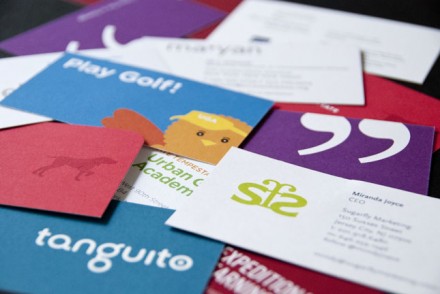R.I.P. business cards?

My friend George sent me an article over the weekend. In it, the author sentences to death another of our world’s paper institutions: the business card.
I say, not so fast.
When sending the article, George, ever the artiste, bemoaned the potential loss of all his favorite printing tricks — mixed varnishes, metallic inks, die cuts, letterpress. And while I think most graphic designers would riot at the thought of not having this fun little medium to work with, there are many [more important] reasons for designers, branders and marketers — or any professional for that matter — to object to this trend. Here are just a few, in no particular order:
1. Business cards are an important brand touch point.
In a world where we are losing more and more opportunities for potential clients to have a tactile experience with our brand, why would we want to take away yet another? Just as there is no equal substitute for a face-to-face meeting, nothing can quite replace these tiny, tangible, 3-D manifestations of our companies. They are often the first interaction a client has with a brand.
To suggest that business cards are only for the purpose of exchanging contact information is to grossly underestimate their value. The style, content, color, even weight of the card speak volumes about your organization. If well designed, the card makes a lasting impression, or breaks the ice, or gives the recipient more information about your company or product. From a branding point of view, these are all valuable opportunities that marketers work really hard to create. Why would we eliminate a medium that’s already achieving them?
2. Business cards legitimize companies and individuals.
A properly designed, properly printed business card makes you official. It says, my company incurred a sizable expense; therefore, I am credible. I do what I say I do. We aren’t a fly-by-night organization. I’m not someone they hired through 1-800-Temps, etc.
Business cards — more specifically, business cards designed by a professional designer and printed at a quality printer — are essential for start-ups and sole proprietors, who don’t necessarily have the track record or staff to reassure a potential customer. For large or established companies, business cards are a credential, a license for the carrier to represent them.
3. Business cards are not an ecological threat.
I have a friend who boils and reuses cloth tampons rather than using disposable ones, yet orders take-out in plastic containers nearly every night. I think refusing to use business cards creates a similar dichotomy. Shouldn’t we be talking about the reams and reams of paper that offices go through daily rather than these 2 x 3.5″ pieces of paper that serve a number of important purposes? I know the two aren’t mutually exclusive, but we do need to have a little perspective here.
4. Business cards are practical!
And here’s the most important point: At the most basic level, business cards are useful. As my partner Brett put it, “If you go to a meeting and cards are exchanged, is it really that cool/interesting/modern to say, ‘We don’t believe in business cards’ if it’s followed by, ‘Let me write my phone number on your arm’?” And if not an arm, a whole piece of paper. How wasteful!
All that said, I’m sure that at some point in the future, business cards will actually be passé, or more important, replaced by a more efficient digital medium. But as eager as the journalist of that article might be to spot the next big trend, I think he got carried away. A number of things will have to happen to kill the cards: Anyone currently over 30 in the U.S. will have to age out of the workforce. (Don’t get me started on Asia.) Graphic designers across the country will have to be heavily sedated or imprisoned. And an app for exchanging contact information will have to be standardized and come pre-installed on every smartphone and tablet, no matter the make. Or, as George says, the digital substitute will be the chip we’ll all have implanted in our heads one day, courtesy of Facebook.